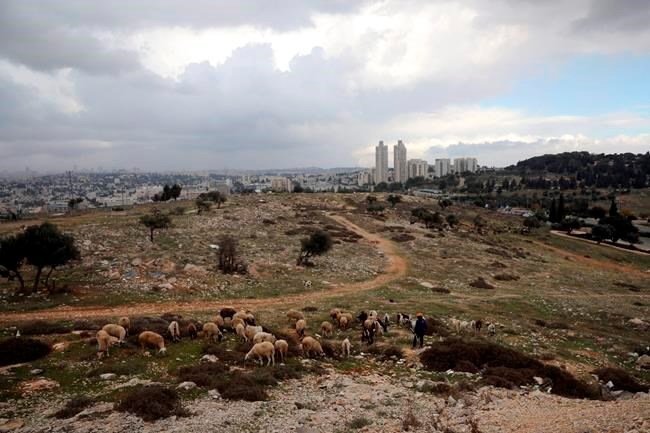JERUSALEM — A settlement watchdog group said Sunday Israel is moving ahead with new construction of hundreds of homes in a strategic east Jerusalem settlement that threatens to cut off parts of the city claimed by Palestinians from the West Bank.
The group, Peace Now, said the Israel Land Authority announced on its
The move may test ties with the incoming administration of President-elect Joe Biden, who is expected to take a firmer tack against Israeli settlement expansion after four years of a more lenient policy under President Donald Trump, who has largely turned a blind eye to settlement construction.
With the Trump administration in its final weeks in office, Israel may be aiming to push ahead on contentious projects before Biden’s term starts, a move that could set it on the wrong foot with the new president.
The approval of the 1,200 homes is a further setback to dwindling hopes of an internationally backed partition deal that would enable the establishment of a Palestinian state alongside Israel.
The Palestinians, along with critics of Israel's settlement policy, say construction in the Givat Hamatos settlement would seal off the Palestinian city of Bethlehem and the southern West Bank from east Jerusalem, further cutting off access for the Palestinians to that part of the city.
“This is a continuation of the current Israeli government policy in destroying the two-state solution," said Nabil Abu Rdeneh, a spokesman to Palestinian President Mahmoud Abbas.
Sunday's development comes as Secretary of State Mike Pompeo is set to travel to the region this week, where he is expected to visit an Israeli settlement in the West Bank — a stop previous U.S. secretaries of state have avoided. Palestinian officials, who have cut off ties with the Trump administration over its policies in
Brian Reeves, a spokesman for Peace Now, said the move Sunday allows contractors to begin bidding on the tenders, a process that will conclude just days before Biden’s inauguration. Construction could then begin within months.
“This is a lethal blow to the prospects for peace," Peace Now said in a statement, adding that Israel was “taking advantage of the final weeks of the Trump administration in order to set facts on the ground that will be exceedingly hard to undo in order to achieve peace.”
The Palestinians seek the West Bank, along with the Gaza Strip and east Jerusalem — areas Israel captured in the 1967 Mideast war — for their future state. With nearly 500,000 settlers now living in the West Bank, and over 220,000 more in east Jerusalem, the Palestinians say the chances of establishing their state are quickly dwindling.
Israel views the entire city of Jerusalem as its eternal, undivided capital.
The European Union's foreign policy chief, Josep Borrell, said he was deeply worried about Israel's latest announcement, saying construction in Givat Hamatos would cause serious damage to the prospects for Palestinian independence.
“The announced settlement activity will lead to the continuing weakening of efforts to rebuild trust and confidence between the parties,” he said. “The government of Israel should instead show vision and responsibility and reverse these negative decisions at this critical and sensitive time.”
Much of Jerusalem is already blocked off from the West Bank by a series of checkpoints and the separation barrier. Israel has previously moved forward on plans to build in E1, another sensitive area east of Jerusalem that critics say, with Givat Hamatos, would block east Jerusalem off entirely from the West Bank.
After four years of Trump, whose policies were hugely
Under previous administrations, Israel held back on building plans in the most sensitive areas, including Givat Hamatos, amid opposition by both Washington and the international community, which saw such plans as dashing hopes for a contiguous Palestinian state.
But Israel has been emboldened under Trump, approving thousands of new settlement homes during his term, including in highly contested areas. Many of those plans are expected to break ground after Biden assumes the presidency.
Tia Goldenberg, The Associated Press



